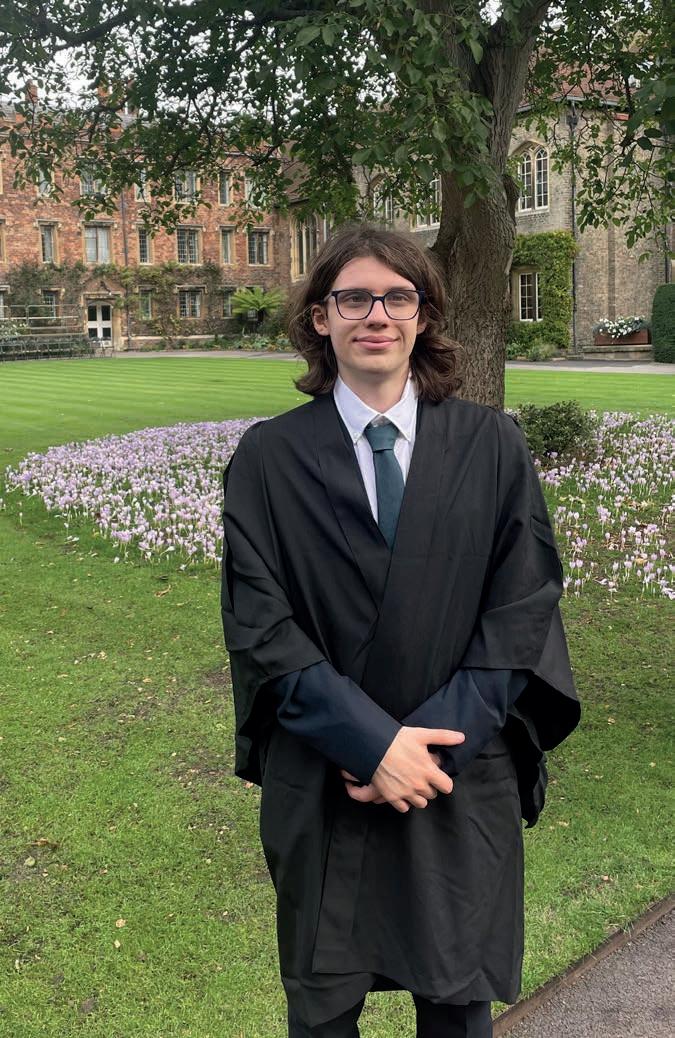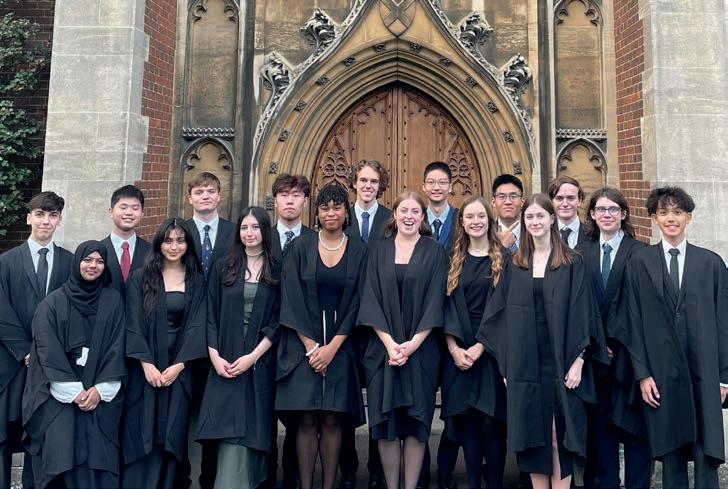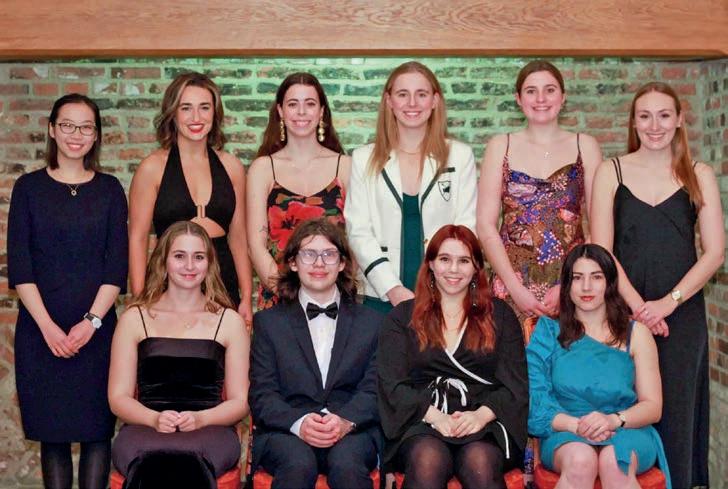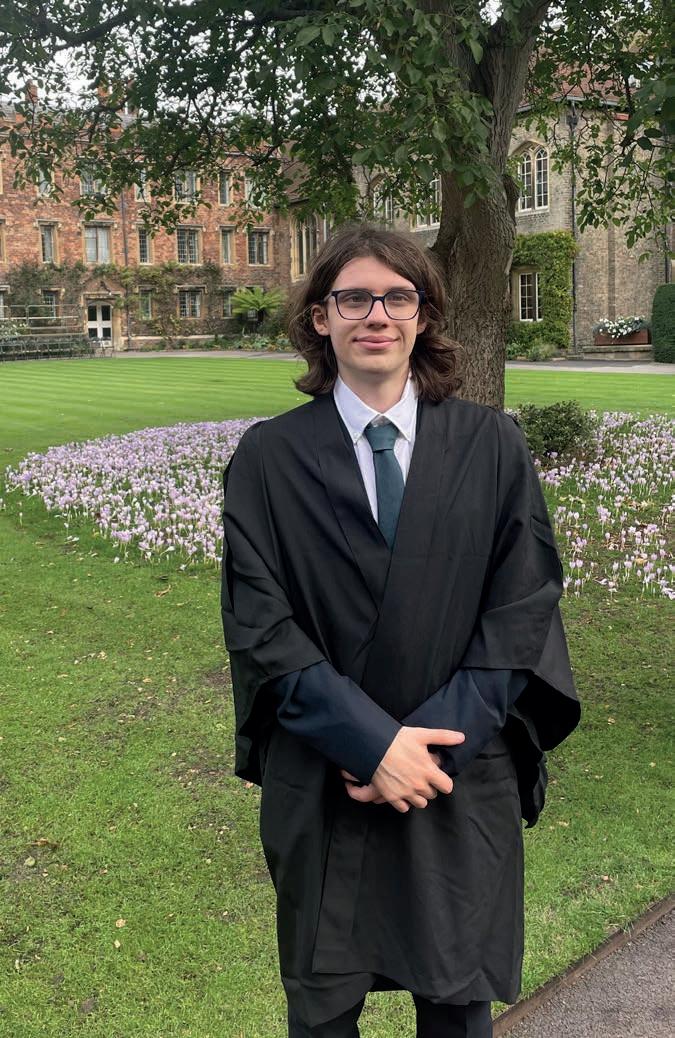
4 minute read
Spreading his wings: an interview with Dara McAnulty
First year Natural Sciences student Dara McAnulty (2022) broke records this year by becoming the youngest recipient on King Charles III’s New Year Honours list when he was awarded a British Empire Medal (BEM) for services to nature and the autistic community. Dara is a multi-award-winning author, naturalist and conservationist from Northern Ireland. He is a campaigner for the natural world, and a dedicated fundraiser, philanthropist, volunteer and wildlife recorder.
Firstly, congratulations on your BEM – how does it feel to be recognised for your work at such a high level?
Advertisement
It felt incredible, obviously, and also really, really strange. I always believe that I’m doing this on behalf of loads of different people and that this award isn’t just for me, but for all of those people who are striving to make a difference in the world, and maybe they’re not saying it. Maybe people are just going through their lives, living them as best as they can to help protect the planet. This award is for them, and for me to be a mouthpiece. So it’s a collective award in that sense. It represents that it all matters, and that people higher up in the Government structures may actually also care. I think that means quite a bit.
How are you finding Queens’?
Currently, I’m doing pretty well. Coming into Lent felt a lot calmer. I also know the city as well now, which surprised me. It means you get to your lectures on time and it makes life just so much easier, you actually know where you are.
Do you have a favourite place for nature or being outdoors in Cambridge?
At the moment like walking to Grantchester. If need a nice long walk, go to Bait’s Bite Lock, all the way up and beyond the Reaches, into the Fens in that direction. Also the Botanical Gardens – I saw a kingfisher on my way there, that was very cool. Those are my three places when I just need a walk to escape the study for a little bit and refresh my head.
You’ve also really got into rowing [as a cox] since being at Cambridge, including the Fairbairn Cup. How was that experience?


There is something really, really cool about going really, really fast! I’ve always lived near water and just being around water is usually where I’m the calmest. Whenever you’re out on the Reach and you’re off, the city just disappears, it’s beautiful. You can get lost in the nature around you.
How would you define your approach to activism?
So I think my approach to activism has changed over the years. It used to be always “protest, protest, protest”, trying to really force these issues in front of the media. But then I realised that you’re not going to reach everybody, and some people, no matter how much you protest, are just going to get annoyed. So decided that there are other ways of changing how people think and that’s through a cultural change.
And so I wanted to write. I wanted to create art. I wanted to fill people’s minds with the beauty of the natural world which I know, and you see it every day when you walk out into the wild. Sometimes it’s very easy to forget it. That’s what I wanted to instil into people’s minds, and hopefully people will read it, and then through that decide to make actions of their own. They don’t need to say them. They don’t need to go out onto the streets. They can just try to live their lives a little bit more carefully, a bit more warily, a bit more conscious of what they’re doing with their life. And that all together makes change.
You’re very candid about how autism is integral to the way that you see the world and the way that you interact with nature as well. Could you talk a little bit about that?
I’m fairly sure see the world slightly differently. I am autistic and sometimes things come in a little bit more intensely for me, and sometimes it can get overwhelming, but it also means I can pay attention to more details more often. Anybody can see all the things that I see if they pay attention. It’s just that I’m more predisposed to seeing those details, not exactly from the experience that probably would have had if I didn’t have it. by my own choice. So in that way, I am forced into this beautiful world. I’m forced to pay attention to it, and by my brain forcing me into it, I grew to love it.
Has your department and Queens’ been accommodating in allowing you to choose what support to access?
Autism obviously affects everybody in different ways. It’s a really complex thing and we don’t really understand much about it. There are a lot of taboos around how autism affects us, and mostly they’re wrong because we don’t know for sure, but we do know that it affects everybody differently. I know people who take in stimuli in a completely different way than do, or all of their different senses interact in ways that they just don’t for me. And know that autism has irreversibly changed my life
I’m trying to be independent and I’m trying to do basically everything myself. But Queens’ has been amazing. I know that not all the colleges are as good. Some people do really, really struggle with getting the help that they need. Queens’ gave me my student support document, I’ve got my extra time, I’ve got all the things that need to be able to function in an exam setting. Outside of academia, want to live my life and try to make it on my own because I’d rather it was that way. I’d like to thank the entire Welfare Team at Queens’ because they’re doing amazing work. What kind of books did you read about wildlife when you were younger? Were there any books like the ones that you’ve written for children out there at the time? When it comes to children’s books, I wrote Wild Child because when I was a child, liked fact books and didn’t really get into fiction until a bit later on. I put fiction in the first section of the book, then love fact books, so I put a fact section in, and I loved activity books, so I put an activity book section in. I hadn’t found a book that put all three together. Then with the Birds (The Wild Child’s Guide to Birds) I did basically the same thing, but with more birds! We did go by seasons for the Book of Birds and there may be another... can write rather quickly so there will be more books, 100%.










